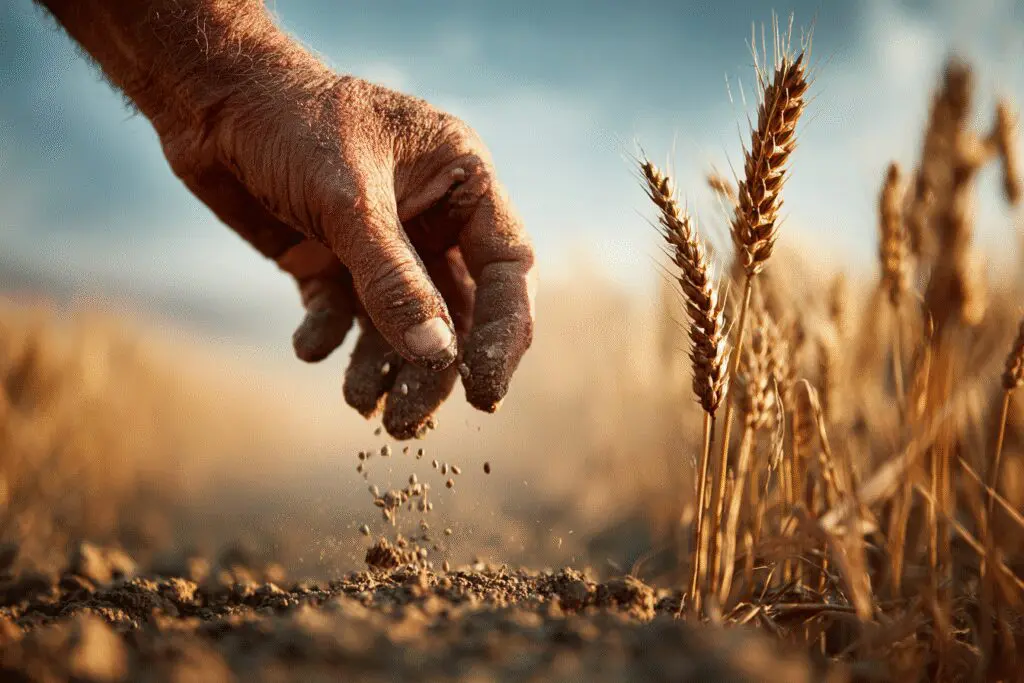Have you ever watched something happen and just thought to yourself, “Well, they had that coming”? Maybe it was a coworker who constantly gossiped, only to find themselves the subject of rumors. Or perhaps you saw someone who was incredibly generous receive an unexpected blessing right when they needed it most. It’s a feeling we all recognize. There seems to be a fundamental fairness hardwired into the universe. We have a simple phrase for it: what goes around comes around. But did you know this popular saying points directly to a powerful and unshakeable truth found in Scripture? The What Goes Around Comes Around Bible principle is one of the most practical and life-altering laws God established.
It’s not karma. It’s not luck. It is the spiritual law of sowing and reaping.
This isn’t some vague, mystical concept. It’s a direct promise from God about how life works. For years, I kind of saw it as a threat, a “be good or else” warning. But the more I’ve walked with Jesus, the more I’ve realized it’s actually a message of incredible hope and empowerment. God isn’t trying to catch us messing up. He’s giving us the instruction manual for a fruitful and blessed life. He’s telling us that our choices today genuinely create our reality tomorrow.
More in Ethics & Morality Category
What the Bible Say About Fools
What Does the Bible Say About Accountability
What the Bible Says About Stealing
Key Takeaways
- The phrase “what goes around comes around” is not in the Bible verbatim, but it perfectly describes the biblical law of sowing and reaping.
- The core principle is found in Galatians 6:7-8, which states that a person will always harvest what they plant. This law is as certain as gravity.
- This principle applies to all areas of life: relationships, finances, personal health, and spiritual growth. Your actions, words, and even thoughts are seeds.
- The harvest is not always immediate. There is often a delay, which reflects God’s patience and gives us time to change course.
- God’s grace through Jesus Christ forgives the eternal consequences of our sinful “seeds,” but it does not always erase the natural, earthly consequences of our poor choices.
- Ultimately, this law is a message of hope. It empowers us to live intentionally, knowing that by sowing good seeds today, we can build a better future.
Is the Phrase “What Goes Around Comes Around” Actually in the Bible?
Let’s get this question out of the way first. If you search the scriptures from front to back, you won’t find the exact words “what goes around comes around.” It’s more of a modern folk wisdom saying.
However, the idea behind it is woven throughout the entire Bible. It’s a concept that is explained in dozens of ways through stories, proverbs, and direct teachings. The saying became popular because it so perfectly captures a spiritual truth that people have observed for centuries.
So, while the phrase itself isn’t biblical, the principle it represents absolutely is. The Bible gives it a more agricultural name: the Law of Sowing and Reaping.
So, What Is the Biblical Law of Sowing and Reaping?
Think about a farmer. A farmer’s success isn’t a mystery. It’s not based on luck or wishful thinking. It’s based on a simple, predictable process. If he wants to harvest corn, he must plant corn seeds. If he plants watermelon seeds, he won’t be surprised when he doesn’t get tomatoes. This is the simple, profound metaphor God uses to explain the law of consequences.
The Core Principle Straight from Galatians
The clearest explanation of this law comes from the Apostle Paul in his letter to the Galatian church.
“Do not be deceived: God cannot be mocked. A man reaps what he sows. Whoever sows to please their flesh, from the flesh will reap destruction; whoever sows to please the Spirit, from the Spirit will reap eternal life.” – Galatians 6:7-8 (NIV)
Let’s break that down.
- “Do not be deceived…” Paul starts this way because we are so easily fooled. We think we can get away with things. We believe we can sow negative seeds and somehow avoid a negative harvest. He’s telling us to wake up to reality.
- “God cannot be mocked.” This is a powerful statement. To mock God is to treat Him as irrelevant, to act as if His laws don’t apply to us. Paul’s point is that you can ignore the law of gravity, but you’ll still hit the ground. In the same way, you can ignore God’s spiritual laws, but you can’t avoid the outcome.
- “A man reaps what he sows.” This is the bottom line. The connection between your actions and your outcomes is absolute. They are linked. What you put in is directly related to what you get out.
It’s a Universal and Unavoidable Law
This isn’t just a rule for Christians. It’s a universal principle for all humanity, like the laws of physics. It was set in motion at creation. It governs the person who follows Jesus and the person who wants nothing to do with Him.
The farmer who plants good seeds in a well-tended field will get a crop, regardless of his personal beliefs. The person who sows kindness and integrity into their work will, over time, reap a harvest of trust and opportunity. The person who sows lies will eventually reap a harvest of broken relationships and suspicion. The law is impartial.
How Does This Sowing and Reaping Principle Work in Real Life?
Okay, this all sounds good in theory, but what does it actually look like day-to-day? The truth is, we are sowing seeds constantly, whether we realize it or not. Every word, every action, every dollar we spend, every thought we entertain—it’s all a seed.
I remember in my first real job out of college. I thought I was clever. I sowed seeds of laziness. I cut corners. I did the bare minimum, thinking I was getting away with something. For a while, it seemed to work. Then, when a promotion opportunity came up, I was completely overlooked. I was frustrated. I felt it was unfair. But looking back, I realize I was simply reaping the harvest of the seeds I had planted. I had sown a reputation for being unreliable. Why would I expect to reap a harvest of more responsibility? It was a hard but valuable lesson.
Sowing Seeds of Kindness and Generosity
The Bible promises that when you give, you will receive. This isn’t just about money. It’s about your time, your energy, and your compassion.
“A generous person will prosper; whoever refreshes others will be refreshed.” – Proverbs 11:25 (NIV)
Think about the most generous people you know. Are they miserable and lonely? Usually not. They are often surrounded by friends and seem to have a certain joy about them. They have spent their lives sowing seeds of encouragement and help, and they reap a harvest of strong relationships and community.
- Sowing a smile to a stressed-out cashier can change their day, and that positivity ripples out.
- Sowing a listening ear to a friend in need builds a bond of trust that will be there for you when you need it.
- Sowing a thoughtful text to someone who is grieving lets them know they aren’t alone.
The Unfortunate Harvest from Sowing Gossip and Deceit
On the flip side, the law works just as powerfully with negative seeds. Sowing negativity is like planting weeds. They grow fast, they are hard to get rid of, and they choke out the good plants.
Have you ever been around someone who constantly complains or gossips? It’s draining. After a while, you start avoiding them. They sow seeds of division and negativity, and they reap a harvest of loneliness and broken relationships. They may not understand why people pull away, but it’s a direct result of the seeds they’ve planted. The Bible is very clear that God detests this kind of behavior, precisely because it destroys relationships and community.
Does This Mean I Get Punished Immediately for Every Bad Thing I Do?
This is where people often get confused. They look around and see someone who is cheating or lying, and it looks like they are getting away with it. They might even be prospering. This can be discouraging.
The Bible’s farming metaphor helps us understand this. A harvest doesn’t come the day after you plant the seeds. There is always a period of waiting. Growth happens under the surface, unseen.
God is incredibly patient. 2 Peter 3:9 tells us that He is “patient with you, not wanting anyone to perish, but everyone to come to repentance.” That delay between sowing and reaping is not a sign that God’s law is broken. It is a sign of His mercy. He gives us time to recognize our mistakes, to repent, and to start planting different seeds.
The harvest for a life of deceit might not come today or tomorrow. But eventually, the crop will come in. Trust will be broken, reputations will be ruined, and peace will be lost.
What if I See Bad People Prospering? That Doesn’t Seem Fair!
This is one of the oldest struggles for people of faith. The psalmist Asaph wrote about this very thing in Psalm 73. He said he almost lost his faith when he saw “the prosperity of the wicked.” They were arrogant, healthy, and wealthy, while he was trying to live a righteous life and was struggling.
It’s a real and valid feeling. The key is to remember that we only see a tiny sliver of reality. We see the temporary, earthly “success,” but God sees the eternal picture. He knows the ultimate harvest that is coming.
Often, the wealth and power gained through dishonest means is a hollow victory. It comes with a harvest of anxiety, fear of being caught, and shallow relationships. What looks like prosperity on the outside can be a prison of misery on the inside. Our job is not to judge the harvest of others, but to focus on tending our own fields.
How Does Grace and Forgiveness Fit Into This Law?
This is the most beautiful part of the story for a Christian. If the law of sowing and reaping were the only thing at play, we would all be in deep trouble. Every one of us has sown bad seeds. We’ve all been selfish, said hurtful things, and made poor choices. We all deserve a harvest of destruction.
But God made a way out.
Jesus, by dying on the cross, stepped in and took the harvest we deserved. He paid the ultimate price for our sinful seeds. When we accept His gift of grace, we are forgiven. The eternal consequence of our sin is wiped away.
However, this is a critical point: Grace does not always erase the earthly consequences of our actions.
If a person robs a bank and then becomes a Christian in prison, they are fully forgiven by God. Their soul is saved. But they still have to serve their prison sentence. They sowed a crime, and they must reap the earthly consequence. If you spend your life sowing unhealthy eating habits, becoming a Christian won’t magically prevent you from having health problems.
Grace gives us a new future and a clean slate with God. It doesn’t turn back time. But it does give us the power to start sowing new, better seeds from this day forward.
What Are the Practical Steps to Start Sowing for a Better Harvest?
This law isn’t meant to scare us; it’s meant to motivate us. Knowing that this principle is real gives us a reason to live with intention. So, how do we start planting the seeds we actually want to see grow in our lives?
Sowing into Your Mind
Everything starts with a thought. Your thoughts are the very first seeds you plant each day. If you plant thoughts of anger, anxiety, and resentment, you will reap a harvest of misery. If you plant thoughts of gratitude, hope, and truth, you will reap a harvest of peace and joy.
This is why Paul tells us in Philippians 4:8 to think about whatever is true, noble, right, pure, lovely, and admirable. He’s telling us to be intentional gardeners of our minds.
- Start your day with gratitude instead of checking your phone.
- When a negative thought comes, consciously replace it with a promise from Scripture.
- Listen to uplifting music or teachings instead of angry talk radio.
- Curate your social media feeds to show you positive and encouraging content.
Sowing into Your Relationships
Relationships are like gardens. They require constant tending and intentional seeding.
- Sow words of encouragement, not criticism. Make it your goal to build people up, not tear them down. You will reap a harvest of loyal and loving friends.
- Sow forgiveness, not grudges. Holding onto bitterness is like drinking poison and hoping the other person gets sick. It only harms you. Releasing forgiveness plants a seed of freedom in your own heart.
- Sow your time and full attention. In a distracted world, the gift of being fully present with someone is priceless. Put your phone away. Listen to understand, not just to respond.
Sowing into Your Future
Your habits today are creating your life five years from now.
If you want a harvest of financial stability, you need to sow seeds of discipline and generosity today. If you want a harvest of good health and energy, you need to sow seeds of good nutrition and exercise today. Understanding the ancient, physical act of farming, as detailed in research from places like Cornell University, shows us that successful agriculture has always been about intentional, forward-thinking actions, not accidents. The same is true for our lives.
This Isn’t a Threat; It’s a Promise of Hope
Please, don’t walk away from this thinking that God is just waiting for you to mess up. That’s not the heart of our Father at all.
The law of sowing and reaping is a message of profound hope. It means you are not a victim of your circumstances. It means your future is not left to fate or chance. You have been given incredible power and responsibility. The life you will have tomorrow is being cultivated by the choices you make today.
No matter what you have sown in the past, God’s grace makes today a new day. You can start planting new seeds right now. You can choose to sow kindness, forgiveness, generosity, and love. And you can trust that God’s law is true, and in His perfect time, you will reap a beautiful harvest.
Frequently Asked Questions – What Goes Around Comes Around Bible

What examples in the Bible demonstrate the principle of sowing and reaping?
Stories like Jacob’s, where he reaps harm after deceiving others, Haman’s downfall after planting hate and pride, and Ruth’s good deeds leading to blessings, all show how actions have outcomes in God’s moral universe.
What is the difference between the biblical principle of sowing and reaping and karma?
While karma teaches that actions create debts to be paid without forgiveness, the Bible teaches that through God’s grace and Jesus Christ’s sacrifice, we can be forgiven and our spiritual harvest can be transformed by God’s love and mercy.
How is the biblical teaching on sowing and reaping different from the worldly saying?
The biblical teaching is rooted in God’s justice and morality, emphasizing that our heart’s intentions matter and that God, who is loving and fair, oversees the harvest of our actions, unlike the worldly saying which presents it as a cold, emotionless force.
What does the phrase ‘What Goes Around Comes Around’ mean in the context of the Bible?
In the Bible, the phrase relates to the idea that our actions have consequences, and we harvest what we plant, reflecting the spiritual law of sowing and reaping that comes from God’s truth, not just chance or luck.




